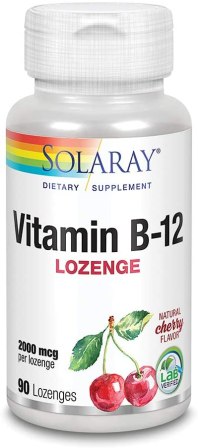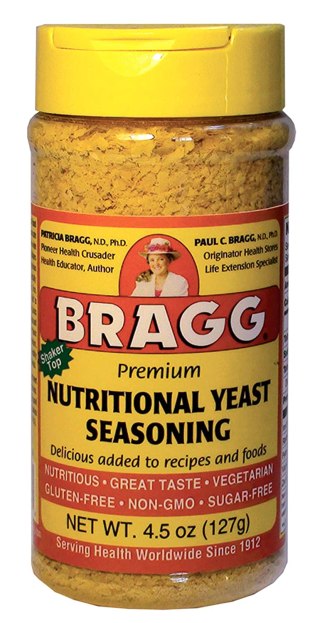As one of the only nutrients that is truly tough to find in the plant-based diet these days, B-12 remains at the heart of the omnivore vs. herbivore controversy. Here’s the lowdown:
B-12 is a bacterial-created vitamin found primarily in soil and critical for proper neurological function and healthy arteries. In a perfect world, the microscopic soil particles which cling to raw garden vegetables (even after they have been washed) would provide all the B-12 we would ever need. We would even find an abundance of it in our mountain streams and well water sources. However, given the current industrial production methodologies of our produce, along with the chlorination processes that most of our modern drinking water undergoes, we are clearly getting far less B-12 than we normally would.
Yes, meat-eaters are likely to ingest a fair quantity of B-12 because farmed animals have eaten plants and/or a variety of other suspect ingredients with these particles either clinging to them or part of the ingredients. (And by the way, when it’s part of the ingredients, it’s usually a safe bet that its origin is from the bacterial contamination so prevalent in factory farm animal feed, which often includes other ground up animals!)
Of course, the overall ramifications of the meat-based diet far outweigh the benefits of picking up a little B-12. In fact, we require such a minuscule amount of B-12 that the organisms in our own mouths and intestines can often reproduce an abundance of it, so long as 1) we have some form of it coming in from our food and/or supplements and 2) we maintain a healthy enough internal environment.
Let’s address these two issues briefly:
1) Food/Supplements: As for dietary sources, enriched soy milk and breakfast cereals, as well as nutritional yeast, are some of the most reliable places to find B-12. Certain vegan “meat” products have a fair amount, as well. And remember, we only require a few micrograms a day. However, just to be on the safe side, I recommend that you simply dissolve a 2000 mcg. B-12 tablet under your tongue once a week. I’ve always used this brand, but I’m sure most any other will do:

By the way, the reason you would take such a high dose in a supplement is because the higher the dose, the less you absorb. So you would either take low doses consistently – 15 to 20 mcgs. daily – or high doses less often. Taking one 2000 mcg. pill a week is a simpler solution.
Hot Tip: If you feel like your B-12 intake has been questionable, pop a 2000 mcg. tablet every day or two for three or four weeks before settling into this suggested weekly regimen. This will help jumpstart your B-12 efforts.
As mentioned, nutritional yeast is an old school choice that I continue to enjoy adding to pasta sauce and salads. It has a mild, cheesy flavor that is surprisingly tasty. Here’s an old stand-by to try:

2. Absorption/Assimilation: When most people talk about B-12, the focus tends to be on sources and amounts. But there is actually a whole other side to the discussion, and it has to do with your internal environment and its ability to properly process and absorb B-12. Here’s what I mean:
The intestinal microbes that actually produce B-12 within our bodies rely on carbohydrates as their food source. When folks forsake getting the proper amount of carbs as their fat intake skyrockets, a couple bad things happen. First, these B-12 producing microbe colonies shrink and simply produce less B-12. Second, the actual B-12 uptake sites become coated in fat and our bodies have trouble assimilating even the reduced amounts of B-12 that our bodies do produce.
Some of the most quantifiable evidence of this phenomenon can be seen in the work of raw food expert, Dr. Douglas Graham. He reports that, on a number of occasions, he’s placed folks with questionable B-12 levels on a strict water fast, where they’ve gone without food all together for a given amount of time. But then, upon retesting, they find that their B-12 levels actually increased, even though there was zero B-12 coming in via outside food sources! And this is only one example about how our diet and lifestyle can affect assimilation.
B-12 bottom-line? Eat B-12 enriched foods when possible, pop a 2000 mcg. B-12 tablet once a week, and watch your overall fat intake.

bobby,
its great to have you back online! thanks for all the info. that you provide for us. what about apple cider vinegar? what are the benefits it provides? thanks for answering our questions, it is always enlightening on what you have to say. i love all the abraham-hicks book too! hope to hear more of you for many years to come.
god bless
trinity and elsie pallanes
I recall reading about 10 years ago that consumption of carbonated beverages leeches B-vitamins out of your system. Any truth to that?
What about 100mcg tabs? Although I don’t always remember to take one, how often would you say I should take that strength, Bobby?
Pingback: Download clockwork prince free
Pingback: food supplements,usmani food supplements
Was it possible to live a healthy vegan lifestyle prior to the advent of B12 supplementation, given the risks of cholera and typhoid, for example?
from 4:20: